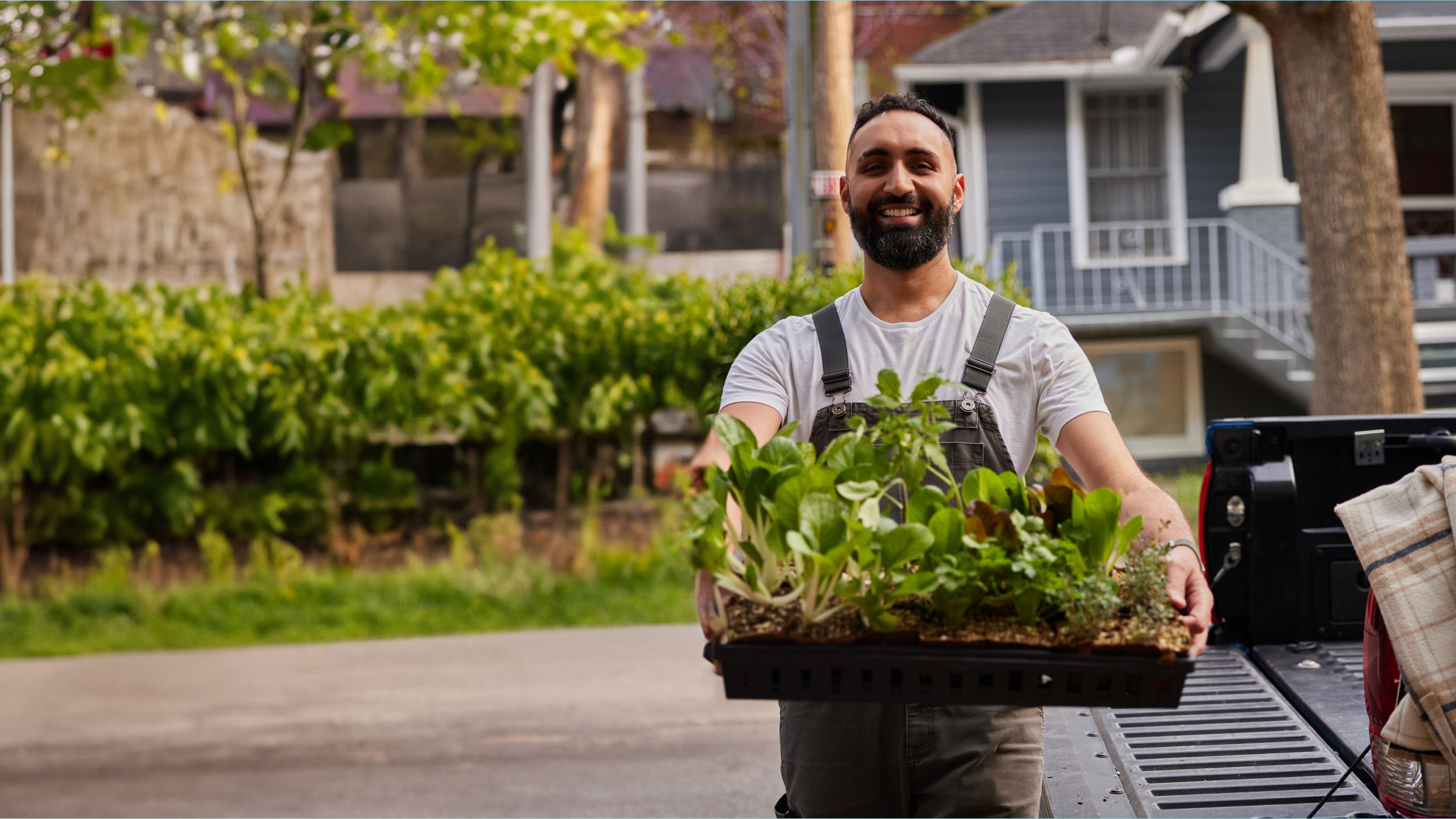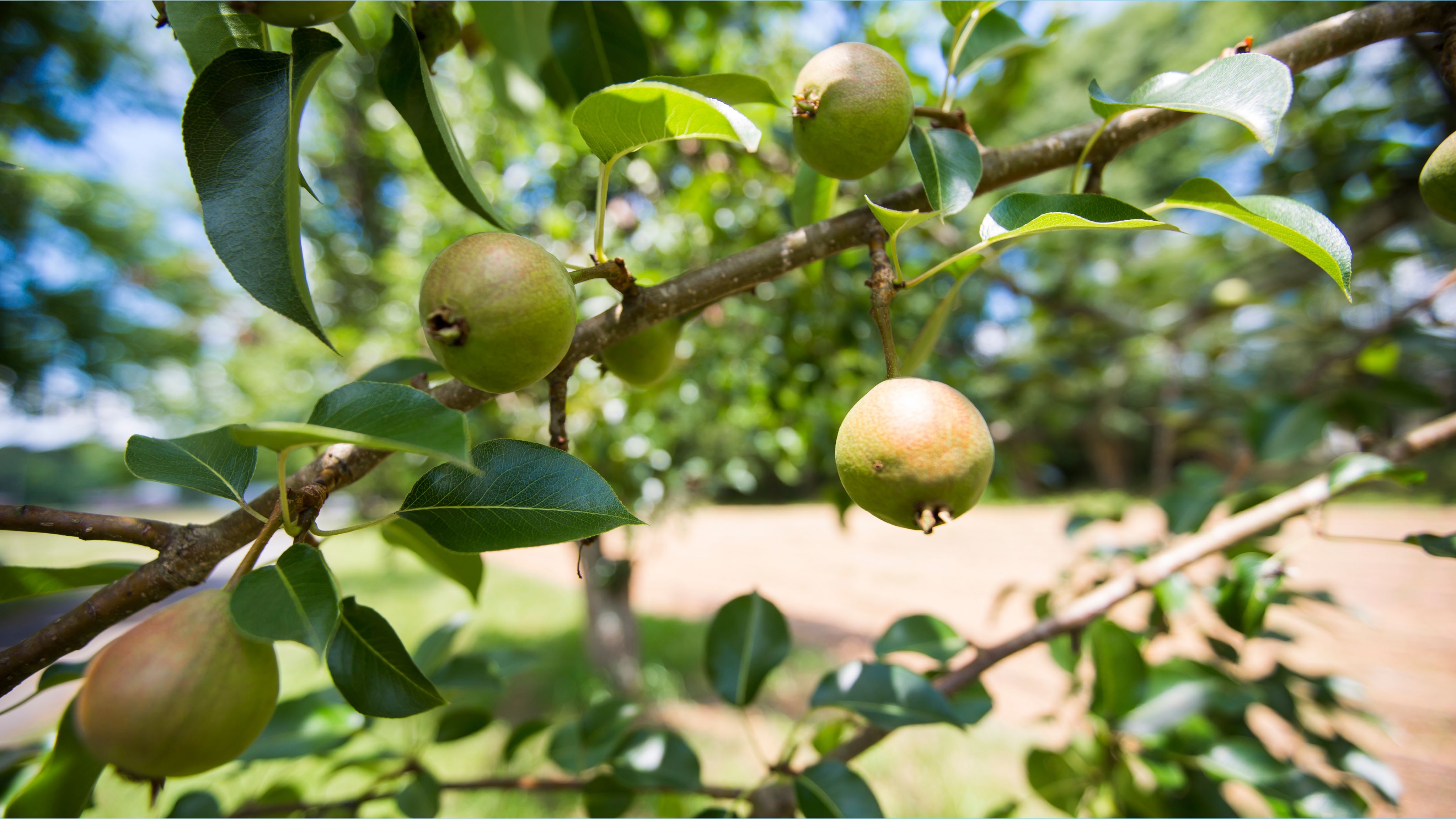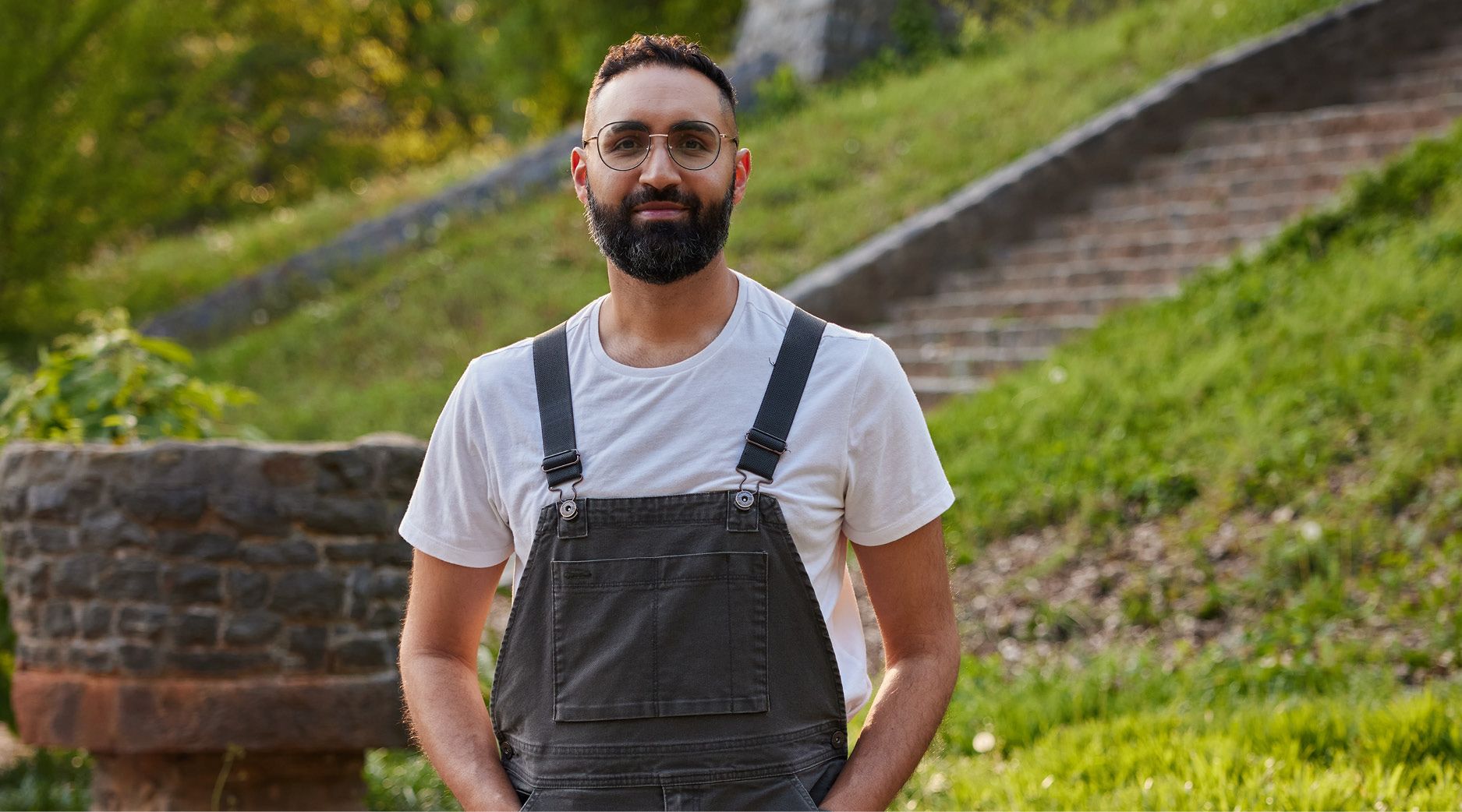(SLOW) FOOD FOR THOUGHT
Emory alumnus Bilal Sarwari, executive director for Slow Food USA, shares why it’s well worth our time to swap out fast food for options that are healthier for us, fairer for farmworkers and overall better for the world.
Interview by Roger Slavens

BILAL SAWARI 07Ox 09C HAS FELT A SPECIAL CONNECTION WITH FOOD ALL HIS LIFE. His parents, Afghan refugees who fled their homeland during the Soviet invasion of 1979, settled in Stone Mountain, Georgia, and worked to maintain their ties to their native culture as they raised two young children on American soil.
His family spoke Farsi at home, practiced Islam and cooked delicious, healthy Afghan food made from ingredients from their home garden or purchased from the DeKalb Farmers Market. Sarwari’s father taught him about gardening and how to appreciate and respect the earth. In fact, one of his earliest memories was of holding a tomato leaf and crushing it in his hands — the musky, earthy smell of the leaf leaving an indelible imprint forever in his mind.
At the same time, Sarwari was compelled to assimilate to U.S. culture. He learned to speak English from watching Sesame Street, and at school he was introduced by classmates and teachers to American ways of life. He viewed McDonald’s and pizza as a treat but seldom indulged, his mother warning him early on against the evils of fast food, teaching him how it was overprocessed and full of unnecessary chemicals. In his teen years, Sarwari admits he pushed back a little as he saw his friends freely indulging in burgers and packaged snacks, but years later he would come to realize just how right his mother was.
As an undergraduate at Oxford, Sarwari started on the pre-med path — earning his bachelor’s degree in anthropology and human biology — yet quickly became fascinated by environmental science, and picked up a minor in the subject. After he matriculated to Emory, Julie Shaffer, then project manager for sustainability, introduced Sarwari to the international Slow Food movement. He found out about the movement’s efforts to promote quality food, raised locally and sustainably, with fair treatment given to farm workers. Inspired by what he learned, he founded Emory’s inaugural Slow Food chapter in 2008.
Bilal Sarwari serves as interim executive director of Slow Food USA.
Bilal Sarwari serves as interim executive director of Slow Food USA.
After graduating, Sarwari embarked upon an eclectic career exploring the work being done in farm-to-table restaurants and on organic farms, including White Oak Pastures, Georgia’s largest. He went into consulting, and became an equity, justice and inclusion adviser for the U.S. Department of Agriculture and other clients. His work has often focused on the intersection of food and human well-being. He created a therapeutic garden for a youth care facility and helped build a robust behavioral health services network to support farmers who suffer incredible job stress due to the debt they incur — and who die by suicide at a rate twice the national average.
Through all of his early career, Sarwari’s involvement with the Slow Food movement steadily grew. Across 16 years of volunteer leadership with the organization, he went from nurturing a strong chapter at Emory to serving on the board of Slow Food Atlanta to becoming a board member of Slow Food USA. In April 2024, he was asked to step down as co-chair of the national board so he could make an even bigger, more direct impact — running the day-to-day operations of Slow Food USA as its interim executive director.

Emory Magazine sat down with Sarwari — over a delicious farm-to-table lunch at Miller Union in West Midtown Atlanta — to learn more about his lifelong connection with slow food and his rise to leading the nation’s foremost organization promoting “good, clean and fair food for all.”


EMORY MAGAZINE: First things first, what exactly is the Slow Food movement and how did it start?
Bilal Sarwari: Slow Food is an international movement that started in 1986 in Rome, Italy. At the time, a fast-food restaurant wanted to open just across the street from the famed Spanish Steps and the Italians were not having it. Instead of showing up with protest signs, however, they showed up with bowls of penne, saying they wanted “slow food” not fast food. In that moment, the Slow Food movement was born. It’s since officially spread throughout more than 2,000 communities all over the globe. These local, grassroots groups are supported by Slow Food International which is based in Bra, Italy. I currently lead Slow Food USA, which supports more than 70 chapters — all volunteer-led — in cities across America. At its core, what the movement is trying to do is create a world where everyone can eat food that is good for them, good for the people that grow it and also good for the planet.
EM: What changes in the global food system does the Slow Food movement specifically advocate for?
Sarwari: For one thing, we’re advocates for biodiversity among our food sources. Right now, the mission of industrial agriculture is to grow and market foods that have long shelf lives, can be easily packaged and shipped long distances. Many of the fruits and vegetables have been bred to have uniform eye appeal as they’re displayed in produce aisles or on our dinner plates. We used to have hundreds of varieties of tomatoes, but the ones you see in the grocery store are primarily red, smooth and almost square — virtual genetic clones of each other. In addition, industrial agriculture has taken a lot of the flavor out of food and stripped it of much of its nutrition and health benefits. To top it off, many fruits and vegetables and even meat sources, once eaten widely, are now threatened to extinction. Through Slow Food’s Ark of Taste program, we catalog and promote these lesser-known or out-of-favor foods — most of which are delicious (for example, the Georgia cling peach) — in the hopes they will be reintroduced to kitchens and restaurants around the world. By creating a market for these foods, we can actually sustain them.
EM: Do you think our food system is inherently broken?
Sarwari: People talk about our broken food system, but I always like to flip that on its head and say that the food system is operating exactly how it was designed. It hinges on petroleum-based fertilizers, herbicide and pesticides. So it links us back to this really harmful dependency on a really limited resource that then constantly releases carbon into the atmosphere. Fast food is bad for the environment and contributes to global warming and climate change. It’s also bad and unfair for the people who work to support it.
EM: You imply that industrial agriculture is largely unfair for those who farm our food. What then is “fair” food?
Sarwari: As a society, we have largely forgotten about the people who grow or raise our food. The history of agriculture in the U.S. is one based on exploitation and cheap or free labor. The country enslaved Africans and forced them on a brutal journey across the ocean to sustain an agricultural system on stolen Native land during the early, attempted colonization of North America. We never truly broke away from that system. Right now, agriculture relies on very cheap and exploited labor. Every fifth bite of food that you take has passed through the hands of a migrant farm worker. Migrant farm workers contribute to our society not only through their taxes, but through their skilled labor. However, they are not offered any of the protections that come from working in other industries. The Slow Food movement fights for better pay and safe, healthy conditions for workers, whether they labor in industrial agricultural fields, small family farms and ranches and in restaurants. I’d like to imagine a future where dining establishments and grocery stores all source their food from local farmers. It would take a sizable commitment of human power and coordination, as well as fair compensation. I think it’s possible and sustainable — and the right thing to do.
EM: What are some of the other negative impacts of fast food?
Sarwari: Our reliance on industrial agriculture means that fast food is not only in our restaurants, but also in the aisles and produce sections of our grocery stores. Not only is it causing conformity and wiping out biodiversity of our food, it’s also wiping away cultural richness. Westernization has a long track record of homogenization. For example, in terms of diversity, Atlanta has one of the largest refugee populations in the world. In fact, the eastern suburb of Clarkston is the most culturally diverse square mile on the planet. However, most of these refugees don’t have access to their own cultural foodways in America. These are the foods that they grew up eating, foods that have special meaning for them, foods that have been grown and eaten generation after generation in their homelands that also happen to be particularly healthy for them. We talk about the Mediterranean diet. We talk about Japanese food being very good and very well balanced. It’s because they’ve figured it out. They’ve had millennia to create a food culture based on their local climate and their local resources that’s healthy and helps them to live longer. This is the way we should be eating.




THE SLOW FOOD MOVEMENT:
IN A NUTSHELL
Slow Food International, born in Rome, Italy, in 1986, advocates worldwide for quality food, raised locally and sustainably, with fair treatment given to farm workers. The movement is a counter to convenience culture, the ubiquity of fast-food restaurants and the dominance of the industrial agriculture industry. The organization, which has more than 2,000 local, volunteer-led chapters across the globe, works to promote “good, clean and fair food for all.” These core tenets can be described as:
1. GOOD
The food must be of high quality, delicious and reflective of local culture and traditions.
2. CLEAN
The production processes must be environmentally friendly, promoting sustainability and minimizing harm to the planet.
3. FAIR
Those involved in producing the food — farmers, artisans, workers — must be treated fairly and paid justly for their work.
To find out more about the Slow Food movement, visit SlowFoodUSA.org.


EM: How much a part of the Slow Food movement is educating people about all of this, waking them up to these impacts they probably haven’t considered?
Sarwari: We’re not here to be the food police. We’re not here to tell people how to eat. Instead, we want to educate and show them the impacts of their choices. It’s my sincere belief that we all have the critical thinking skills to make conscious choices about the food we eat, including what’s the best for our health, the best for those growing the food and the best for the planet and environment. All these things are tied together. That’s why I’m so passionate about the Slow Food movement and why all of my career choices so far have led me here. My main goal is to get people to think, really think about food in meaningful, intersectional ways.
EM: Is there a way Slow Food USA recognizes farms and restaurants who support the movement?
Sarwari: Yes, absolutely. We have gone national with our Snail of Approval program that recognizes businesses who have truly embraced the Slow Food movement. Our local chapters invite farms, restaurants and suppliers to apply for the designation, asking them to detail their practices that support good, clean and fair food. What do they do to make sure they’re producing quality food? How are their employees taken care of? How do they make sure they’re using sustainable practices and taking care of the environment? The local chapters then spend a lot of time vetting, reviewing and issuing Slow Food’s Snail of Approval to worthy businesses — demonstrated by a decal they can display proudly on their windows. Atlanta, in particular, has an incredibly robust chapter and at their annual meeting earlier this year awarded several Snail of Approval awards to local restaurants and farms.
EM: What can we do as consumers to support the Slow Food movement?
Sarwari: Well, the important thing is to start small and start slowly. You can’t change all your buying and cooking habits right away, and the decisions you might make are complex and sometimes difficult. I’d recommend beginning by doing some research. You can find out more about the Slow Food movement by visiting SlowFoodUSA.org. It’s a great place to visit with lots of resources and information to get you going. The first, smallest changes you make probably can happen at your current grocery store, focusing your shopping on the periphery — in the produce section, the meat counter, the dairy section, the bakery, the bulk grains. Look for fruits and vegetables, preferably organic (though a step in the right direction, organic is not perfectly clean as some think) that you might not usually buy. Choose the oddly shaped heirloom tomatoes instead of the ones neatly packaged. Aim for biodiversity. For optimal flavor, make sure you’re buying fruits and vegetables in the right season. To take your efforts up a notch, shop at local farmer’s markets and ask questions about the food and how it was grown — they will be happy to answer. The more you can stay away from packaged and overly processed foods, the better. A healthy change you can make is to gather around good, clean and fair food, either at home or out at a locally-owned restaurant, ideally one that has our Snail of Approval. Slowing down also means taking the time to enjoy cooking and eating with loved ones and friends — building community and forging human connections. Whatever you do, take it one step at a time, maybe even one food at a time. Make small, slow changes to your diet and shifts in your food choices and it will eventually add up.



Want to know more?
Please visit Emory Magazine, Emory News Center and Emory University.



